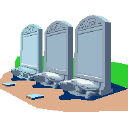A Brief History by Barbara Henry © 2003
The Freedom Cemetery has an English Section and a Welsh Section called the Welsh Yard. Today, two separate organizations maintain the cemetery. The Welsh section is owned by the Freedom Cemetery Society and the English section by the Freedom Cemetery Association. A line of bushes provides the present-day division once marked by a stone fence. The layout and governance of the cemetery is rooted in history.
When the first Ebenezer Welsh Baptist Church was constructed on the Freedom Flats in 1843-44, Welsh immigrants set aside a portion of the site for use as a burial ground. Deacon John Lewis donated the land, located in the southwestern part of Lot 13 in the Town of Freedom. Nearby were the burials of English speaking Yankee settlers, who had settled in Freedom in the early decades of the 1800s. Rufus Metcalf, who came from Vermont in 1811, donated the land for the English section.
The earliest Welsh Yard burials are those of young children, including Phebe Ann Owens, age 9 months, daughter of John H. and Catharine Owens (1844); Mary Ann Higgins, age 3, daughter of John and Laura Higgins (1846); Hugh Jones, son of William and Elizabeth Jones (1847); George Phillips, age 1, son of David and Mary Ann Phillips (1847). Other Welsh burials of note include: Civil War soldiers, various Welsh Baptist church deacons and ministers, William H. Williams whose gravestone claims that he was “the first Welsh settler in Cattaraugus County” and Robert T. Williams, “father of the Welsh settlement.” A number of gravestones contain Welsh-language inscriptions and the deceadent’s place of origin in Wales. Over the years more burials were made until the Welsh Yard and the English Yard of the Freedom Cemetery became a microcosm of nineteenth-century Freedom, including the Yankees, the Scots, and the Welsh.
An English-speaking group split off from the Welsh-speaking Ebenezer Church in 1895 and formed the Bethel Baptist Church. Early on the Bethel trustees sought, but failed, to gain a division of the Ebenezer property which at that time included the burial yard surrounding the church building.
In 1903 the English section of the cemetery incorporated. In November 1914, a well-attended meeting at the Ebenezer Church voted unanimously to incorporate the Welsh side of the cemetery. The directors of the newly incorporated Welsh section were: Robert J. Williams, William P. Morgan and David J. Morgan. It is not known if the Bethel Welsh were involved in the 1914 cemetery meeting, since as late as 1917 the Bethel and Ebenezer Welsh were still at odds with each other. Eventually, differences were resolved. In 1919 the Bethel and Ebenezer Welsh reunited to form the Freedom Baptist Church. In 1921 the stone wall which physically divided the English and Welsh sections was taken down.
In 1953 the Freedom Baptist Church moved to legally transfer ownership of the Ebenezer church building to the Freedom Cemetery with the stipulation that the church be maintained as a memorial and chapel. The cemetery rejected the idea and the transference was never completed. Until it fell in January 2001, the old Ebenezer church building belonged to the Freedom Baptist Church but the ground on which it rested belonged to the Freedom Cemetery Society. In 2003, an historic marker commemorating the Freedom area Welsh settlement was placed at the site by the Freedom Area Welsh Historic Marker Committee.
Early Welsh Yard burial records were no doubt contained in the Ebenezer church records. The location of these records is not known. However, an old lot map of the Welsh Yard survived. Besides the names of lot owners, the map, drawn on old fashioned oilcloth, features a primitive style painting of the church and cemetery, as it looked around the turn-of-the century. According to cemetery officials, cemetery records were destroyed in a fire. The Town of Freedom historian maintains alphabetical lists of gravestone inscriptions for both English and Welsh sections of the cemetery.
Click on Icon for Partial Listing
